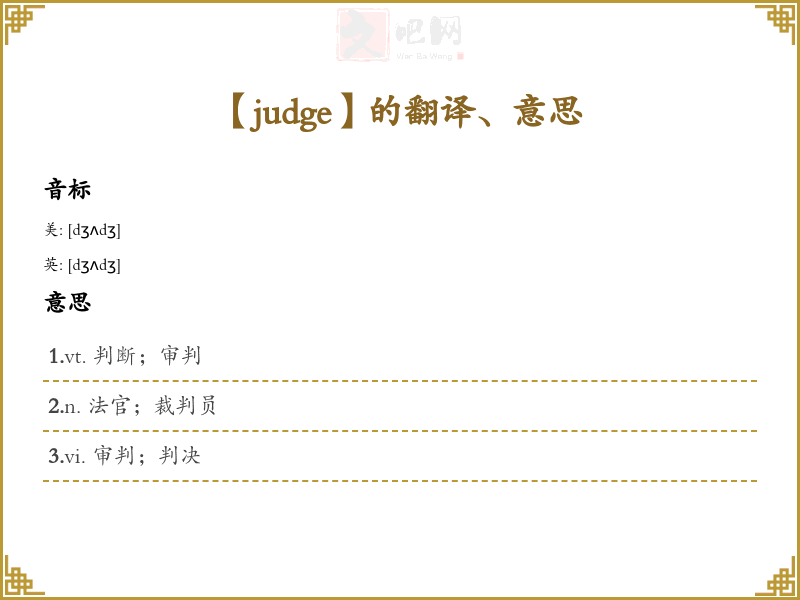【judge】的翻译、意思
时间: 2025-04-25 14:35:11
【judge】怎么读
美:[dʒʌdʒ]
英:[dʒʌdʒ]
【judge】是什么意思、字义解释
1. vt. 判断;审判
2. n. 法官;裁判员
3. vi. 审判;判决
4. n. (Judge)人名;(英)贾奇
【judge】的详细解释
英文单词学*与分析:[judge]
1. 基本定义
- 字面意思:judge 的字面含义为“评判”或“裁决”,指的是对某事物进行评价或做出决定的行为。
- 定义:作为动词,judge 意指对某人或某事进行评价、形成意见或做出决定;作为名词,它指的是负责审理案件的人,通常是法官。
2. 词源与起源
-
词源分析:judge 源自古法语 "juger",进一步源自拉丁语 "judicare",由 "jus"(法律)和 "dicere"(说)组合而成,意味着“说出法律”。
-
历史背景:judge 一词在英语中首次出现于13世纪,主要用于法律和审判的上下文中。
-
课本:在**教材中,judge 可能出现在小学和初中的英语课本中,例如《新概念英语》。在牛津和美国的教材中,可能出现在高中英语课程中,如《Oxford English》或《American English》系列。
3. 使用场景
-
正式与非正式语境:在正式语境中,judge 通常指法官或审判者,例如在法律文书或法庭上;在非正式语境中,它可以用来描述个人对某事的看法或评判,如在日常对话或社交媒体上。
- 例子:In the courtroom, the judge made a fair decision.(在法庭上,法官做出了公正的决定。)
-
特殊场合:在法律领域,judge 是指执行法律职能的人;在科学研究中,judge 可能用来描述对实验结果的评价。
- 例子:The judge ruled that the evidence was inadmissible.(法官裁定该证据不予采纳。)
4. 示例句子
-
As a judge, he must remain impartial.
作为法官,他必须保持公正。- 来源:法律教材
-
Don’t judge a book by its cover.
不要以封面来评判一本书。- 来源:谚语
-
She judged the competition with great enthusiasm.
她以极大的热情评判了比赛。- 来源:文学作品
-
The judge sentenced the defendant to five years in prison.
法官判处被告五年监禁。- 来源:法律案例
-
He often judges people too quickly.
他经常过快地评判他人。- 来源:日常交流
*. In my opinion, he is the best judge of character.
在我看来,他是判断人品的最佳人选。
- 来源:个人见解
-
The judge’s decision was final and could not be appealed.
法官的决定是最终的,不能上诉。- 来源:法律教材
-
We should not judge others without knowing their circumstances.
我们不应在不了解他人情况的情况下评判他人。- 来源:社会评论
5. 同义词与反义词
- 同义词:assess(评估),evaluate(评估),appraise(鉴定)。它们的微小差异在于,assess 和 evaluate 更强调过程,而 judge 更强调结果。
- 反义词:ignore(忽视),overlook(忽视),disregard(无视)。这些词表示对某事不做评价或注意。
. 学方法
- 音标记忆法:judge 的音标为 /dʒʌdʒ/,可以通过分解音节来记忆,例如“dʒ”(发音类似于“朱”)+“ʌdʒ”(发音类似于“急”)组合在一起联想为“朱急”,形成记忆。
7. 关联词汇
- 高频搭配词汇:judge a case(审理案件),judge someone’s character(评判某人的性格),judge fairly(公正评判),judge by appearances(凭外表判断),judge harshly(苛刻评判)等。
通过以上分析,学*者可以更全面地理解和运用“judge”这个单词。
【judge】例句
1、[N-COUNT/N-TITLE] A judge is the person in a court of law who decides how the law should be applied, for example how criminals should be punished. 法官
-
例:The judge adjourned the hearing until next Tuesday.法官将听证延至下星期二。
2、[N-COUNT] A judge is a person who decides who will be the winner of a competition. 裁判员
-
例:A panel of judges is now selecting the finalists.裁判组现在正在选拔参加决赛的选手。
3、[V-T] If you judge something such as a competition, you decide who or what is the winner. 评判
-
例:He was asked to judge a literary competition.他被邀请评判一场文学竞赛。
4、[V-T] If you judge something or someone, you form an opinion about them after you have examined the evidence or thought carefully about them. 判断
-
例:It will take a few more years to judge the impact of these ideas.还需要再过几年才能判断这些思想的影响。
-
例:I am ready to judge any book on its merits.我会根据每本书自身的性质来对其进行评判。
-
例:It's for other people to judge how much I have improved.应当由别人来评判我进步的大小。
5、[V-T] If you judge something, you guess its amount, size, or value or you guess what it is. 估计
-
例:It is important to judge the weight of your washing load correctly.正确估计你的待洗衣物的量很重要。
-
例:I judged him to be about forty.我估计他四十岁左右。
6、[N-COUNT] If someone is a good judge of something, they understand it and can make sensible decisions about it. If someone is a bad judge of something, they cannot do this. 鉴定人
-
例:I'm a pretty good judge of character.我非常善于判别性格。
7、[PHRASE] You use judging by, judging from, or to judge from to introduce the reasons why you believe or think something. 根据…判断
-
例:Judging by the opinion polls, he seems to be succeeding.根据民意调查判断,他似乎稳操胜券。
-
例:Judging from the way he laughed as he told it, it was meant to be humorous.从他讲述时笑的方式看来,那是为逗人发笑。
